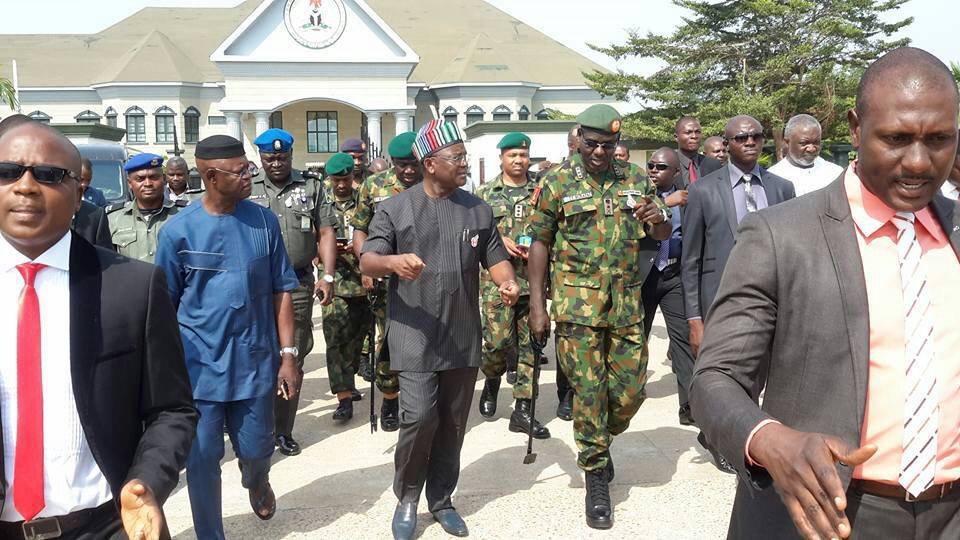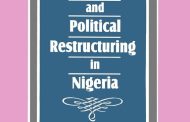The clearest indication that no behind the scene efforts have been made by any set of stake holders in peace in Nigeria showed today at Omusu Village in Okpokwu LGA of Benue State when the state governor, Dr Samuel Ortom told the people to return to their villages and back it up. Interpreted as ‘defend your villages’, it shows that neither the Nigerian State nor any set of actors, local and global, has found a way out of what has become known as herdsmen violence in recent history of Nigeria. Omusu, a completely peasant settlement, has been the site of an attack yesterday that has left death and destruction in its wake in what marks a shift of attacks from Tivland to Idomaland, the two main cultural components of the state. Understandably, anger and a sense of revenge is said to pervade the community and even among its sons and daughters in urban centres as Abuja, Lagos, Kano, etc.
The governor who was visiting along with unspecified officials from Abuja told Edumoga people who went to welcome him on behalf of Omusu community most of whom have left the village that there is no going back on the anti-open grazing law because Benue State has the right to make laws just as other states who made laws. Intervention stringer at the reception said the governor cited the case of the Sharia laws of the early 2000s. Sharia law held and ours must also hold, the governor was quoted as saying. For the governor, what has happened to Omusu is the reason why the anti-open grazing law is the only way forward. Welcomed by District Heads, Ward Heads, Okpokwu elite and political notables and interspersed with a stop over at Ojapo, the most urban part of the lower section of the vast Edumoga District, the governor assured the community of government support to overcome the violence.
Without the governor saying it, Benue State is virtually on the edge of violence. It is not because of herdsmen violence but the strong perception of an agenda of conquest and Islamisation in the violent siege across the land. The situation is compounded by a multiplicity of opinion about what might be happening. Some people argue that it is corruption that is fighting back, others say it is Boko Haram members scattered by the military onslaught that has changed the battlespace from the Northeast to a kind of ‘everywhere war’, yet others say it is intra-agency politics that has undermined actions that could have curtailed the killing going on across the country. There is a particularly interesting position pushed by the platform called the Coalition of Northern Groups which argues that it is all a conspiracy against the North. In an over 6000 word document it circulated recently, the coalition set in details why it thinks so. Among others, the coalition said:
“We are extremely worried and profoundly agitated by the recent trend of escalation of conflict in some parts of the North especially of the nature of inter-ethnic and inter-communal clashes. We believe that there are underground forces that are driving these unrests and fuelling tensions aimed at rendering large swathes of Nigeria ungovernable, concentrating in the North. We believe, and rightly so, that the unrests are being instigated by powerful interests across some states in order to achieve certain hidden objectives. Having tried desperately since independence to create anarchy in the country and woefully failed, these agents of mayhem are now resorting to other means to achieve their nefarious aims”.
It is not about whether the coalition is right or wrong but about how confusing the security situation is in Nigeria today to even some of the high-up people that appear to go along with the view of the coalition. What would have been needed to re-assure everyone would have been a very categorical and incisive analysis of the situation and a doctrine of containment of the menace by the Nigerian State, symbolised by the president. But, instead of such, the president is arguing that management of conflict is not the sole responsibility of the state. His eloquent silence has also confounded many hitherto. The question is what sort of water the president has in his mouth that he cannot talk. As the state appears to have run out of innovative responses to a major challenge, a society on the edge of a cliff is an understatement in describing current situation. Nigeria has always managed to land safely from crossroads such as this. Whether that is what will happen in this case is a different matter.




























